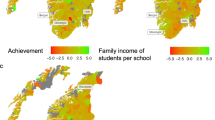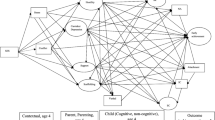Abstract
The present study used a genetically-sensitive quantile regression approach to examine the relation between participation in early childhood education and care (ECEC) and subsequent school performance in literacy and numeracy at grades 3, 5, 7, and 9. The sample consisted of 1255 twin pairs (596 MZ; 659 DZ) with information on both ECEC and the National Assessment Program-Literacy and Numeracy (NAPLAN) scores from the Twin Study of NAPLAN. Results indicated variation in heritability estimates across the distributions of achievement, suggesting that different patterns of etiological influences may exist among children of different ability levels. Additionally, the results provided no evidence that ECEC significantly influenced achievement, and in the genetically-sensitive analyses, no evidence that ECEC moderated the influences of heritability of achievement for typically advantaged children. These results suggest that ECEC may not provide the levels of environmental support for later achievement that advocates claim, although we acknowledge that ECEC quality, which was not measured in the current study, may make a difference in whether or not ECEC influences achievement.












Similar content being viewed by others
Notes
The estimates for each quantile are not independent and therefore the significance of changes in heritability and the shared environment across the range of scores cannot be calculated (Logan et al. 2012); therefore we advise caution when interpreting any differences among estimates at different quantiles.
Results without the standard error correction did show more instances of significant shared environmental influences across the quantiles of achievement; however, neither ECEC hours nor ECEC months significantly moderated these influences suggesting the more conservative correction we used did not influence the ECEC results.
References
Baker M, Gruber J, Milligan K (2008) Universal child care, maternal labor supply, and family well-being. J Polit Econ 116:709–745
Baker M, Gruber J, Milligan K (2015) Non-cognitive deficits and young adult outcomes The long-run impacts of a universal child care program. NBER Working Paper 2157. DOI: https://doi.org/10.3386/w21571. Available from http://www.nber.org/papers/w21571
Barnett WS (1995) Long-term effects of early childhood programs on cognitive and school outcomes. Future Child 5:25–50
Bishop DVM (2001) Genetic influences on language impairment and literacy problems in children: same or different? J Child Psychol Psychiatry 42(2):189–198
Bowen NK, Bowen GL, Ware WB (2002) Neighborhood social disorganization, families, and the educational behavior of adolescents. J Adolesc Res 17(5):468–490
Bronfenbrenner U, Ceci SJ (1994) Nature-nurture reconceptualized in developmental perspective: a bioecological model. Psychol Rev 101(4):568
Burger K (2010) How does early childhood care and education affect cognitive development? An international review of the effects of early interventions for children from different social backgrounds. Early Child Res Q 25(2):140–165
Burger K (2015) Effective early childhood care and education: successful approaches and didactic strategies for fostering child development. Eur Early Child Educ Res J 23:743–760
Claessens A, Garrett R (2014) The role of early childhood settings for 4–5 year old children in early academic skills and later achievement in Australia. Early Child Res Q 29(4):550–561
Claessens A, Engel M, Curran FC (2014) Academic content, student learning, and the persistence of preschool effects. Am Educ Res J 51(2):403–434
Cohen S, Evans GW, Stokols D, Krantz DS (2013) Behavior, health, and environmental stress. Springer, New York
Coley RL, Votruba-Drzal E, Miller PL, Koury A (2013) Timing, extent, and type of child care and children’s behavioral functioning in kindergarten. Dev Psychol 49:1859
Coley RL, Lombardi CM, Sims J (2015) Long-term implications of early education and care programs for Australian children. J Educ Psychol 107(1):284
Erbeli F, Hart SA, Kim YSG, Taylor J (2017) The effects of genetic and environmental factors on writing development. Learn Individ Differ 59:11–21
Fox S, Geddes M (2016) Preschool-two years are better than one: developing a preschool program for Australian 3-year-olds-Evidence, policy and implementation. Mitchell Institute Policy Paper No. 03/2016. Mitchell Institute, Melbourne. Available from: www.mitchellinstitute.org.au
Friend A, DeFries JC, Olson RK (2008) Parental education moderates genetic influences on reading disability. Psychol Sci 19(11):1124–1130
Grasby KL, Coventry WL, Byrne B, Olson RK, Medland SE (2016) Genetic and environmental influences on literacy and numeracy performance in Australian school children in Grades 3, 5, 7, and 9. Behav Genet 46(5):627–648
Hart SA, Soden B, Johnson W, Schatschneider C, Taylor J (2013) Expanding the environment: gene × school-level SES interaction on reading comprehension. J Child Psychol Psychiatry 54(10):1047–1055
Immervoll H, Barber D (2006) Can parents afford to work? Childcare costs, tax-benefit policies and work incentives
Knopik VS, Neiderhiser JM, DeFries JC, Plomin R (2016) Behavioral genetics. Macmillan Higher Education, New York
Kovas Y, Haworth CMA, Harlaar N, Petrill SA, Dale PS, Plomin R (2007) Overlap and specificity of genetic and environmental influences on mathematics and reading disability in 10-year‐old twins. J Child Psychol Psychiatry 48(9):914–922
Lipsey MW, Hofer KG, Dong N, Farran DC, Bilbrey C (2013) Evaluation of the Tennessee Voluntary Prekindergarten Program: Kindergarten and First Grade Follow-Up Results from the Randomized Control Design. Peabody Research Institute, Research Report
Little CW, Haughbrook R, Hart SA (2017) Cross-study differences in the etiology of reading comprehension: a meta-analytical review of twin studies. Behav Genet 47(1):52–76
Logan JAR, Petrill SA, Hart SA, Schatschneider C, Thompson LA, Deater-Deckard K, Bartlett C (2012) Heritability across the distribution: an application of quantile regression. Behav Genet 42(2):256–267. https://doi.org/10.1007/s10519-011-9497-7
Lykken DT, Bouchard T Jr, McGue M, Tellegen A (1990) The Minnesota twin family registry: some initial findings. Acta Genet Med Gemellol (Roma) 39:35–70
Magnuson KA, Ruhm C, Waldfogel J (2007) Does prekindergarten improve school preparation and performance? Econ Educ Rev 26:33–51
Marks GN (2016) The relative effects of socio-economic, demographic, non-cognitive and cognitive influences on student achievement in Australia. Learn Individ Differ 49:1–10
McGowan D, Little CW, Coventry WL, Corley R, Olson RK, Samuelsson S, Byrne B (2019) Differential influences of genes and environment across the distribution of reading ability. Behav Genet 49:425–431
McGue M, Bouchard TJ Jr (1984) Adjustment of twin data for the effects of age and sex. Behar Genet 14(4):325–343
OECD, Strong S (2017) Starting Strong 2017: key OECD Indicators on early childhood education and care. OECD Publishing, Paris. https://doi.org/10.1787/9789264276116-en
Olson RK, Keenan JM, Byrne B, Samuelsson S, Coventry WL, Corley R,.. . Pennington BF (2011) Genetic and environmental influences on vocabulary and reading development. Sci Stud Read 15(1):26–46
Pascoe S, Brennan D (2017) Lifting our game: report of the review to achieve educational excellence in Australian schools through early childhood interventions. Victorian Government, Melbourne, Vic. Retrieved from https://trove.nia.gov.au/229882800
Petscher Y, Logan JA (2014) Quantile regression in the study of developmental sciences. Child Dev 85(3):861–881
Petscher Y, Logan JAR, Zhou C (2013) Extending conditional means modeling: an introduction to quantile regression. In: Petscher Y, Schatschneider C, Compton DL (eds) Applied quantitative analysis in the social sciences. Routledge, New York, pp 3–33
Pianta RC, Barnett WS, Burchinal M, Thornburg KR (2009) The effects of preschool education: What we know, how public policy is or is not aligned with the evidence base, and what we need to know. Psychol Sci Public Interest 10(2):49–88
Plomin R, McGuffin P (2003) Psychopathology in the postgenomic era. Ann Rev Psychol 54(1):205–228
Plomin R, Kovas Y (2005) Generalist genes and learning disabilities. Psychol Bull 131(4):592
Purcell S (2002) Variance components models for gene–environment interaction in twin analysis. Twin Res Hum Genet 5(6):554–571
Sampson RJ, Morenoff JD, Gannon-Rowley T (2002) Assessing “‘neighborhood effects’”: social processes and new directions in research. Annu Rev Sociol 28:443–478
Taggart B, Sylva K, Melhuish E, Sammons P, Siraj I (2015) Effective pre-school, primary and secondary education project (EPPSE 3-16+). Department of Education, London
Taylor J, Erbeli F, Hart SA, Johnson W (2019) Early classroom reading gains moderate shared environmental influences on reading comprehension in adolescence. J Child Psychol Psychiatry 61(6):689–698
Tucker-Drob EM (2012) Preschools reduce early academic-achievement gaps: a longitudinal twin approach. Psychol Sci 23(3):310–319
Watters A (2015) Literature Review of the Impact of Early Childhood Education and Care on Learning and Development. Working Paper. Cat. No. CWS 53. Australian Institute of Health and Welfare
Whitehurst GJ (2013) New evidence raises doubts about Obama’s Preschool for All. Brookings: The Brown Center Chalkboard Series Archive. Retrieved from https://www.brookings.edu/research/new-evidence-raises-doubts-on-obamas-preschool-for-all/
Acknowledgements
This research was supported by an Australian Research Council Grant (DP150102441). The Australian Twin Registry is supported by an enabling Grant (628911) from the National Health and Medical Research Council. We thank the Australian Twin Registry, and all of the twins, triplets, and parents involved. Views expressed herein are those of the authors and have neither been reviewed nor approved by the granting agencies.
Author information
Authors and Affiliations
Corresponding author
Ethics declarations
Conflict of interest
Callie W. Little, Sally Larsen, Brian Byrne, Jessica A. R. Logan, Richard K. Olson, and William L. Coventry declare that they have no conflict of interest.
Human and Animal Rights
All procedures were performed in accordance with the ethical standards of the University of New England (HE12-150).
Informed Consent
Informed consent was obtained from all individual participants included in the study.
Additional information
Edited by Stephen Petrill.
Electronic supplementary material
Below is the link to the electronic supplementary material.
Rights and permissions
About this article
Cite this article
Little, C.W., Larsen, S., Byrne, B. et al. Exploring the Influence of Early Childhood Education and Care on the Etiology of Achievement. Behav Genet 50, 387–400 (2020). https://doi.org/10.1007/s10519-020-10013-z
Received:
Revised:
Accepted:
Published:
Issue Date:
DOI: https://doi.org/10.1007/s10519-020-10013-z




